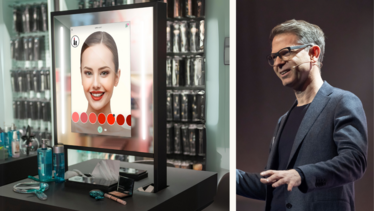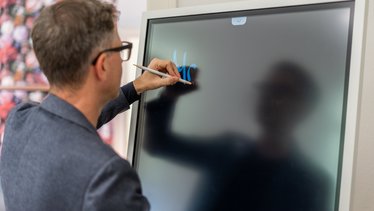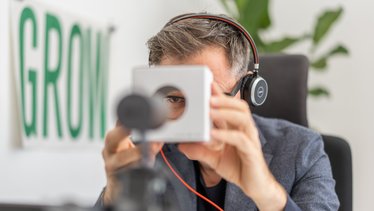
As we navigate through an era of rapid technological advancement and societal change, understanding future trends becomes more crucial than ever. At DOUGLAS, we are committed to staying at the forefront of innovation and adapting to the evolving landscape of beauty and retail industry. To gain deeper insights into the transformative 'MegaTrends' shaping our future, we had the privilege of speaking with renowned futurist Mathias Haas.
What inspired you to become a futurologist and trend researcher, and how do you go about identifying and analyzing megatrends?
Mathias Haas: It is not that complicated to see the future and if you make the effort you will be less surprised. You, all of us people and organizations are therefore hardly ever in “panic mode”. An attitude that keeps an eye on the major megatrends makes life much more relaxed. I personally like that a lot and at the same time, companies of all kinds are so busy in “daily business” that this trend observation is very well received. How do we do our work? Read, read, read. Testing and trying things out. Summarize and process. Each of our engagements is different - but of course it's always about the future fitness of a person or an organization.
What influences and trends do you believe will significantly impact the retail sector in the coming years?
Mathias Haas: The climate crisis has enormous implications and is therefore very relevant - also and precisely because it is not taken seriously in some cases. People will not go shopping at 38°C, for example, and customers will hardly be active even at home. Demographic change is another “big issue”. At the same time, Artificial Intelligence can offer enormous relief and productivity gains - already today! Regardless of the megatrend, strategic decisions need to be made and consistently implemented.


How do you imagine “tomorrow's” beauty shopping at DOUGLAS – whether in our stores or online shops?
Mathias Haas: Our basic needs will not change. For example, we want attention. The tools and our behaviors will change - for example, because DOUGLAS offers opportunities today. This may include brands reacting very quickly to short-term hype. Here I love to refer to all the collaborations of fashion and beauty brands with celebrities. It has been shown again and again that high sales can be generated with exclusive editions and short sales periods. Back to “beauty itself”: “virtual beauty” will become enormously strong. It's simply fun to maintain a digital twin of yourself. Maybe we'll even go shopping with it at some point. Somehow it's already like that today. Thanks to various filters, I give myself advice.
All this even happens in the bathroom, the last private retreat. Technology is moving in here. The keywords are “smart watches”, “smart beauty and medtech devices” and “smart mirrors”. Clinically validated blood pressure monitors or even small health laboratories for the home are already available today.
One of your theses is that one of the challenges of our time is that people are overwhelmed in today's hyper-connected world. What strategies do you recommend to companies to help both employees and customers to deal with it?
Mathias Haas: At least we all feel overwhelmed. And if that's the case, we have to take it seriously. It is not uncommon for customers to “collapse” before they buy. There is simply too much on offer, too many options and a lack of orientation. The solution is the latter... so it must be easy to “pigeonhole” a brand. What does the DOUGLAS Group or a beauty brand stand for? And what does it not stand for. The clearer the profile, the more attractive. After all, nobody wants to “do a degree” when they go shopping. Long story short... It's all about clarity and simplicity. About differentiation. This requires courage and consistency. That is brand management.
Speaking of which, this also applies to the company, of course. What does a department stand for? Or even myself? In “The Apple Marketing Philosophy”, for example, it says: “People DO judge a book by its cover”. Yes, it simply has to be!

What specific wish do you have for our future as a society?
Mathias Haas: That we regularly deal with our future. In the USA, this movement is called “Strategic Foresight”. There are so many major changes and we are not always well prepared. #FaxMachines
So, it's time for us all to roll up our sleeves and get fit. For example, when it comes to AI. This applies to companies, but also to every individual. Including myself. I'll make a bet here: If each of us invests 2 to 5 hours a week in AI tools and their use, then we will never regret it. It will be frustrating and exhausting in the short term, but we will definitely be fitter in the long term. This is the gym for the future, so to speak. And that's exactly where we meet again. I promise.